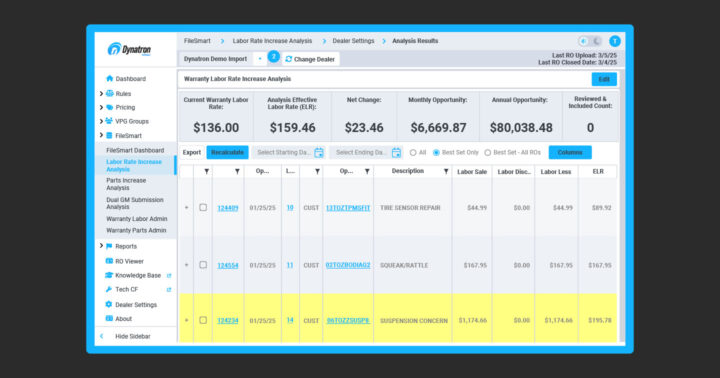Running a successful dealership means keeping Fixed Operations efficient and profitable. Yet, manual processes and outdated tools can lead to missed opportunities and wasted time. Dealership Management Software for Fixed Operations solves these challenges by streamlining workflows, providing real-time data, and supporting smarter decision-making. The right software empowers your team to boost productivity, improve customer service, and drive greater profits.
In this article, we’ll highlight the essential dealership software tools for Fixed Operations, explore how they transform service departments, and look ahead at future innovations. Whether you lead a team or oversee strategy, you’ll find practical insights to help your dealership grow.

What Kind of Software Do Car Dealerships Use?
Car dealerships rely on various software solutions to manage their complex operations and ensure profitability. These tools are not just about crunching numbers; they serve as the backbone for streamlining processes, enhancing customer interactions, and maintaining an organized inventory. Key software types include:
Dealership Management Systems (DMS)
A Dealership Management System (DMS) serves as the operational hub of a dealership, managing core tasks like accounting, inventory, service scheduling, and compliance on a unified platform.
For Fixed Ops, DMS capabilities such as tracking repair orders, managing parts inventory, and optimizing labor schedules reduce inefficiencies. This real-time visibility ensures service departments meet customer demands without delays, while consolidating data supports informed decision-making to boost profitability.
Customer Relationship Management (CRM) Tools
CRM systems help dealerships build and nurture long-term customer relationships by organizing customer data like service histories, contact details, and preferences.
Service departments benefit from CRM tools that enable personalized communication, such as automated reminders for maintenance or targeted promotions. These strategies prevent service gaps, ensure steady customer engagement, and effectively fill service bays during slower periods.
Inventory Management Software
Accurate inventory management is vital for both the sales and parts departments. Inventory management tools provide real-time stock tracking, reducing risks of overstocking or running out of essential parts.
By aligning inventory visibility with a DMS, dealerships improve forecasting and maintain just-in-time stock levels. For Fixed Operations, this capability minimizes service delays and boosts customer satisfaction, as technicians have the required parts readily available.
Software for Operational Efficiency and Profitability
These software solutions collectively enhance efficiency across operations. By investing in integrated tools, such as Dynatron’s PriceSmart solution, dealerships can identify the “perfect price”, improve customer satisfaction, and uncover opportunities for revenue growth in Fixed Ops. These types of software, like Dynatron, integrate with a DMS to pull the data feeds necessary to provide deeper insights.
What Do CRMs Do For Dealerships?
Customer Relationship Management (CRM) systems allow dealerships to track customer interactions, streamline communication, and deliver personalized service. These tools are instrumental in fostering loyalty and driving repeat business.
Tracking and Managing Customer Data
A CRM organizes critical customer details like service history, preferences, and contact information. This centralized data allows service advisors to make informed recommendations and improve customer interactions through personalized attention.
For instance, CRMs provide instant access to customer records during appointments, reducing wait times and ensuring services align with client history.
Automating Follow-Ups and Communication
Automated follow-ups, such as reminders for oil changes, tire rotations, or seasonal check-ups, keep customers engaged without burdening staff. This proactive approach fosters trust and increases retention.
Driving Revenue Growth Through Insights
By analyzing CRM data, service managers can identify trends and tailor promotions, increasing upsell opportunities. For example, frequent routine maintenance customers can receive targeted service package offers, driving revenue without resorting to guesswork.

How Do I Organize My Car Dealership?
Efficient dealership organization is critical for improving productivity and profitability. A Dealer Management System simplifies workflows by integrating inventory, service, and financial operations into a centralized platform. A DMS can help organize various key aspects of the business, such as:
Streamlining with Inventory Management
Accurate inventory oversight ensures that service parts and vehicles are readily available without overstocking. A DMS provides real-time data on inventory status, enabling service managers to avoid shortages that could delay repairs.
With insights into usage trends, dealerships can forecast demand, balance stock levels effectively, and avoid bottlenecks caused by unavailable parts.
Optimizing Service Schedules
The service bay is one of the busiest and most profitable areas of a dealership. With a DMS, service scheduling becomes streamlined, allowing managers to allocate resources, assign technicians to tasks efficiently, and accommodate last-minute changes.
Unifying Financial Reporting
Dealer management systems unify financial information across departments, providing real-time performance insights. For service managers, this means monitoring technician productivity, parts revenue, and labor rate trends, allowing quick adjustments to optimize profitability.
Fostering a Cohesive Workflow
A DMS aligns processes across sales, service, and inventory. For example, when a vehicle is sold, the system can notify the service department to prepare it for delivery, fostering a seamless workflow.
A Smarter, More Profitable Dealership
A properly implemented DMS for the automotive industry is more than just a software tool—it’s the backbone of a well-organized dealership. By centralizing data, automating tasks, and aligning operational goals, these systems empower dealerships to run more efficiently and profitably.
For service managers and executive leaders, adopting a DMS removes the stress of juggling disconnected processes and provides the structure needed to meet customer expectations. With an optimized workflow, dealerships can focus on growth and consistently deliver the best possible service experience.
What Does a DMS Mean in Automotive?
Automotive dealerships manage a diverse set of activities daily, from tracking vehicle inventory and processing customer transactions to managing service appointments and financial operations. A modern DMS provides the technological foundation needed to bring these tasks together into a singular, cohesive workflow.
Core Functions of a Dealer Management System
- Service Operations: Enables comprehensive management of repair orders, technician schedules, and labor tracking to improve efficiency.
- Inventory Management: Real-time inventory tracking ensures optimal stock levels, reducing delays caused by missing parts.
- Financial Integration: Automated financial updates reduce errors and deliver actionable insights, empowering better decision-making.
- Customer Engagement: Integrated CRM features enhance customer experiences by delivering personalized service recommendations and updates.
Why a DMS is Essential for Dealership Success
For Fixed Operations, a DMS maximizes service bay utilization, ensures stock availability for repairs, and monitors key performance metrics like labor efficiency. By reducing errors and improving workflows, this software can help boost profitability while meeting customer expectations when utilized properly.
What is the Future of Dealer Management Systems?
Dealer management systems are evolving rapidly to meet the demands of digital transformation. Emerging features promise to redefine dealership efficiency and customer engagement. Below, we take a closer look at the emerging trends and features driving the evolution of the best dealer management system.
AI-Driven Insights and Predictive Analytics
Artificial intelligence enables predictive analytics, helping dealerships forecast service trends, optimize labor rates, and manage inventory efficiently. For example, AI can anticipate part failures, ensuring availability just when needed.
Cloud-Based Solutions for Flexibility and Scalability
Cloud-based systems provide dealerships with remote access to real-time data, ensuring flexibility. Multi-location stores benefit greatly, as it allows for centralized inventory management and performance metrics from a single dashboard.
Mobile-First Connectivity
Mobile-compatible tools empower technicians and customers alike—technicians can update repair orders via tablets, while customers can book appointments or track services conveniently from smartphones.
Sustainability and EV Readiness
As electric vehicles (EVs) rise in prominence, leading DMS platforms now include modules dedicated to EV-specific needs, such as battery diagnostics and inventory management for EV parts.
What is an Automotive Dealer Management System?
An Automotive Dealer Management System (DMS) is a comprehensive software solution designed for running a dealership. An Automotive DMS streamlines operations by combining inventory tracking, service management, and sales workflows into a unified system. This integration allows businesses to run more efficiently, deliver exceptional customer service, and enhance profitability.
Benefits for Fixed Operations
- Inventory Oversight: Maintains real-time stock visibility for parts and vehicles.
- Service Efficiency: Streamlines repair scheduling and technician productivity.
- Customer Retention: Offers personalized service notifications and targeted promotions.
- Financial Insights: Provides centralized dashboards for monitoring dealership profitability.
Maximize Potential with the Right Tools
Dealership Management Software is central to optimizing Fixed Operations, addressing inefficiencies, and improving profitability. Tools like Dealer Management Systems and Customer Relationship Management tools simplify processes, enhance decision-making, and ensure seamless collaboration across departments. By investing in advanced dealership software, service managers and executives can streamline operations, deliver superior customer experiences, and unlock new pathways for growth.
With proven results like $250K+ in additional annual revenue, Dynatron Software’s PriceSmart solution, powered by the innovative new Repair Order Insights (ROI) platform, delivers real, measurable impact. Dealers typically see a 22x ROI in Year 1, followed by 16x in Year 2, 14x in Year 3, and 12x by Year 5—demonstrating consistent, long-term value. Now is the time to leverage this data-driven technology to boost profitability, stay ahead of customer expectations, and gain a competitive edge in Fixed Ops.
Schedule a demo today to discover how Dynatron Software can help you achieve your Fixed Ops goals. Transform the way you manage your dealership and start driving growth with confidence!